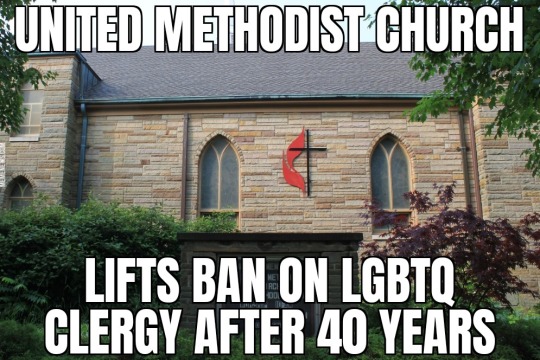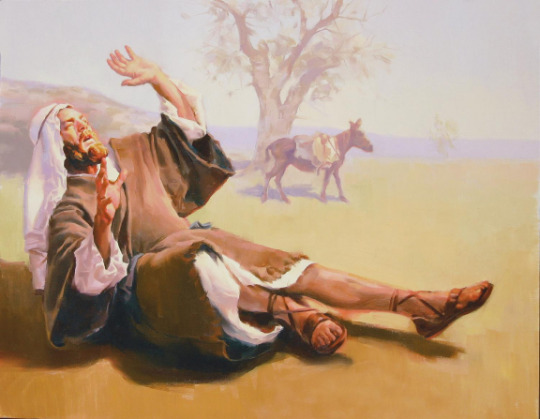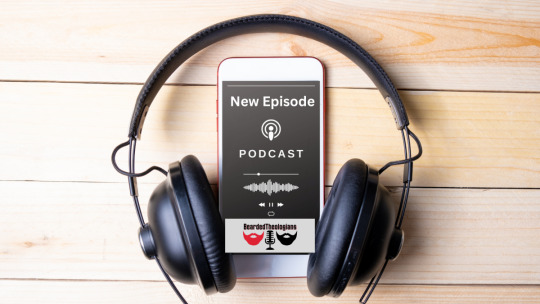#United methodist
Explore tagged Tumblr posts
Text
It took just a few days for United Methodist delegates to remove a half-century’s worth of denominational bans on gay clergy and same-sex marriages. But when asked at a news conference about the lightning speed of the changes, the Rev. Effie McAvoy took a longer view. “Oh, it didn’t take days, honey,” she said. It took decades of activism for a change that was “so very healing,” said McAvoy, pastor of Shepherd of the Valley United Methodist Church in Hope, Rhode Island. A member of the Queer Delegate Caucus at last week’s UMC General Conference in Charlotte, she was grateful to be part of the historic moment. The reversals can be seen as marking the end of a half-century of epic battles and schisms over LGBTQ involvement — not only in the United Methodist Church but in U.S. mainline Protestant denominations overall. Those are the tall-steeple churches in myriad town squares and rural crossroads, traditionally “big-tent” and culturally mainstream congregations — some predating America’s independence. The nation’s largest Methodist, Presbyterian, Episcopal and Lutheran denominations have all now removed barriers to LGBTQ participation in the pulpit and at the altar. But this comes amid long-term declines in membership and influence. Surely there will be skirmishes to come. Individual congregations, and entire regions across the world, will sort out the implications. Controversies have grown among some conservative evangelical churches and colleges, which largely avoided past battles. But for mainline Protestants, last week’s General Conference looks like a landmark. It was a relatively quiet coda to what had been an almost annual scene on America’s religious calendar — impassioned showdowns at legislative assemblies of Protestant denominations, marked by protests, political maneuverings and earnest prayers.
19 notes
·
View notes
Text
Methodists lift LGBTQ ban
Photo credit: Dwight Burdette, CC BY 3.0, Wikimedia. GET THE FULL STORY Methodists lift LGBTQ ban.

View On WordPress
#christian#christianity#equality#gay#lesbian#LGBT#lgbtq#lgbtqia#memes#methodist#news#religion#United methodist
11 notes
·
View notes
Text
Quote from Steve Wozniak about computers; with my reflection at the end.
#pastormike1976#you are awesome#don't forget it#words#quote#quotes#Steve Wozniak#trust#computer#throw#love hate relationship#tech#technology#setup#progressive clergy#progressive pastor#progressive christian#umc#united methodist#united methodist church#lgbt#lgbtq#lgbtqia#gay
3 notes
·
View notes
Text
The Wrong Jesus
The following is adapted from a sermon I gave at a revival Ebenezer United Methodist Church in Hickory Flat, Mississippi. I recommend reading 1 Samuel 8:4-22 and Luke 23:13-25 before reading this. Copyright (c) 1996 Zedcor Inc. All Rights Reserved.Keywords: 19th century religious art color Jesus brought before crowd Pilate columns Behold The Man by Antonio Ciseri, color As a kid, I went to a…

View On WordPress
2 notes
·
View notes
Text
This Affiliation
But Saul began to destroy the church. Acts 8:3 Then the church throughout Judea, Galilee and Samaria enjoyed a time of peace and was strengthened. Acts 9:31 Do you know what happened between the first scripture and the second? Jesus happened. On the road to Damascus, Jesus spoke to Saul and brought about a complete reversal in that man’s life. Once Saul stopped persecuting the church, he became…

View On WordPress
1 note
·
View note
Text
3.14.24 Beardcast with Rev. Matt Miofsky
This week we sat down with Matt Miofsky and talked about his new book The Methodist Book of Daily Prayer You can buy the book and his others at http://mattmiofsky.com/ Connect with the Bearded Theologians at https://www.linktr.ee/Beardedtheologians You can find the Beardcast on Youtube, Apple, Spotify, Castbox, Amazon, Google, or wherever else…

View On WordPress
#Beardcast#beardedtheologians#beards#Blogging#God#Holy Spirit#Jesus#podcast#prayer#spirtual disciplines#spirtual life#theology#UMC#United Methodist#vodcast
0 notes
Video
youtube
"Lord Have Mercy" Pastor Jeff Lust, November 26th 2023
Pastor Jeff Lust preaches "Lord Have Mercy" based on Luke 17:11-19 during 9 am Worship on Sunday November 26th, 2023.
Want to support the ministry at First United Methodist Church of Mesa?
Donate at https://app.sharefaith.com/app/giving/firs6957441
Watch the full Worship Service at Livestream.com/FirstChurchMesa
#youtube#downtown mesa#mesa az#mesa#arizona#arizona churches#arizona life#first church of mesa#first united methodist church of mesa#first church mesa#looking for a church#mesa community#mesa local#lord have mercy#united methodist church#umc#united methodist
0 notes
Text
#religion#christianity#protestantism#methodist#united methodist church#umc#lgbtq#article#divinum-pacis
131 notes
·
View notes
Text
102 notes
·
View notes
Text
Jason DeRose at NPR:
The United Methodist Church, one of the largest Protestant denominations in the U.S., has voted to repeal its ban on LGBTQ clergy as well as prohibitions on its' ministers from officiating at same-sex weddings. Delegates overwhelmingly approved the changes, 692 to 51, during the United Methodist Church's General Conference. The meeting is taking place this week in Charlotte, N.C. after the pandemic delayed the 2020 General Conference where these decisions has been slated to take place.
The tone of the Charlotte meeting has been decidedly upbeat, in sharp contrast with the last, highly contentious global meeting back in 2019, when heated floor debates left many feeling hurt. In fact, there was no floor debate over the clergy and marriages rules this time around. Rather, they were included on a consent agenda. However, in the years leading up to this General Conference, about one-quarter of United Methodist congregations in the U-S left the denomination. Those congregations tended to be among the most conservative in the church. Their departure made the decisions this year less fraught. Some of those departing congregations left to form the more conservative Global Methodist Church and others decided to become independent. The main reason many of those congregations left the denomination is that despite the church's official rules against LGBTQ clergy and same-sex weddings, some local geographic conferences chose to not enforce them.
At the United Methodist Church's General Conference today, the UMC voted overwhelmingly to lift its ban on LGBTQ+ clergy and denominational clergy officiating same-sex weddings.
This is made possible in party by the departure of more conservative churches to either the Global Methodist Church, independent of any denomination, or other Wesleyan denominations.
See Also:
LGBTQ Nation: United Methodist Church ends ban on LGBTQ+ clergy in historic vote
CNN: United Methodist Church lifts 40-year ban on LGBTQ clergy
#2024 UMC General Conference#United Methodist Church#United Methodist Church Split#UMC#LGBTQ+#LGBT Religion#Religion#Christianity
75 notes
·
View notes
Text
Christianity, and inclusivity
Having some kind of feelings about realizing I've wound up in Filial Piety Mode re: doing an organized religious activity.
I was raised United Methodist Christian. Despite being very involved in my family's church growing up, I rejected this entirely around age 19. Full-on obnoxious internet atheist period ensued for several years, tempered by me growing a sense of nuance after a bit.
Now I'm well into my 30s, and last year my mom very hesitantly asked if my brother and I would be willing to maybe attend their (newish) church's Christmas Eve service with them, so their friends they'd been telling about for months/years could meet us.
And we did, and it was great, honestly. I was happy to volunteer to go again this year. It's still not where I place whatever faith I have, honestly, but it meant a lot to me a few years ago when the United Methodist Church became, uh, less united, over queer people, and my parents left the specific church they'd been members of for 30 years because of it. The local conference said, "lol, we'd like to keep being bigots" and they said, "alright, we're out."
Their current PCUSA church is very welcoming, and I'm still not going to be a Christian again, but I do know the rituals and I don't mind making my mom happy by attending. (Also, their friends are awesome.)
#personal#i don't know how else to tag this#christianity#united methodist church#it did things to me watching my mom struggling with the UMC environment in real-time
7 notes
·
View notes
Text

"The original "Uncle Tom",
Rev. Josiah Henson and wife; Dresden ,Canada (c1907)
Josiah Henson (June 15, 1789 – May 5, 1883) was an author, abolitionist, and minister. Born into slavery in Charles County, Maryland, he escaped to Upper Canada (now Ontario) in 1830, and founded a settlement and laborer's school for other fugitive slaves at Dawn, near Dresden in Kent County. Henson's autobiography, The Life of Josiah Henson, Formerly a Slave, Now an Inhabitant of Canada, as Narrated by Himself (1849), is widely believed to have inspired the character of the fugitive slave, George Harris, in Harriet Beecher Stowe's Uncle Tom's Cabin (1852), who returned to Kentucky for his wife and escaped across the Ohio River, eventually to Canada. Following the success of Stowe's novel, Henson issued an expanded version of his memoir in 1858, Truth Stranger Than Fiction. Father Henson's Story of His Own Life (published Boston: John P. Jewett & Company, 1858). Interest in his life continued, and nearly two decades later, his life story was updated and published as Uncle Tom's Story of His Life: An Autobiography of the Rev. Josiah Henson (1876).
Josiah Henson was born on a farm near Port Tobacco in Charles County, Maryland. When he was a boy, his father was punished for standing up to a slave owner, receiving one hundred lashes and having his right ear nailed to the whipping-post, and then cut off. His father was later sold to someone in Alabama. Following his family's master's death, young Josiah was separated from his mother, brothers, and sisters.His mother pleaded with her new owner Isaac Riley, Riley agreed to buy back Henson so she could at least have her youngest child with her; on condition he would work in the fields. Riley would not regret his decision, for Henson rose in his owners' esteem, and was eventually entrusted as the supervisor of his master's farm, located in Montgomery County, Maryland (in what is now North Bethesda). In 1825, Mr. Riley fell onto economic hardship and was sued by a brother in law. Desperate, he begged Henson (with tears in his eyes) to promise to help him. Duty bound, Henson agreed. Mr. R then told him that he needed to take his 18 slaves to his brother in Kentucky by foot. They arrived in Daviess County Kentucky in the middle of April 1825 at the plantation of Mr. Amos Riley. In September 1828 Henson returned to Maryland in an attempt to buy his freedom from Issac Riley.
He tried to buy his freedom by giving his master $350 which he had saved up, and a note promising a further $100. Originally Henson only needed to pay the extra $100 by note, Mr. Riley however, added an extra zero to the paper and changed the fee to $1000. Cheated of his money, Henson returned to Kentucky and then escaped to Kent County, U.C., in 1830, after learning he might be sold again. There he founded a settlement and laborer's school for other fugitive slaves at Dawn, Upper Canada. Henson crossed into Upper Canada via the Niagara River, with his wife Nancy and their four children. Upper Canada had become a refuge for slaves from the United States after 1793, when Lieutenant-Governor John Graves Simcoe passed "An Act to prevent further introduction of Slaves, and to limit the Term of Contracts for Servitude within this Province". The legislation did not immediately end slavery in the colony, but it did prevent the importation of slaves, meaning that any U.S. slave who set foot in what would eventually become Ontario, was free. By the time Henson arrived, others had already made Upper Canada home, including African Loyalists from the American Revolution, and refugees from the War of 1812.
Henson first worked farms near Fort Erie, then Waterloo, moving with friends to Colchester by 1834 to set up a African settlement on rented land. Through contacts and financial assistance there, he was able to purchase 200 acres (0.81 km2) in Dawn Township, in next-door Kent County, to realize his vision of a self-sufficient community. The Dawn Settlement eventually prospered, reaching a population of 500 at its height, and exporting black walnut lumber to the United States and Britain. Henson purchased an additional 200 acres (0.81 km2) next to the Settlement, where his family lived. Henson also became an active Methodist preacher, and spoke as an abolitionist on routes between Tennessee and Ontario. He also served in the Canadian army as a military officer, having led a African militia unit in the Rebellion of 1837. Though many residents of the Dawn Settlement returned to the United States after slavery was abolished there, Henson and his wife continued to live in Dawn for the rest of their lives. Henson died at the age of 93 in Dresden, on May 5, 1883.
#Josiah Henson#Dresden#uncle tom#original uncle tom#american revolution#dawn township#kent county#methodist#preacher#tennessee#ontario#rebellion#dawn settlement#john graves simcoe#province#slaves#united states of america#united states#war of 1812#african#kemetic dreams#afrakan#africans#brownskin#afrakans#brown skin
76 notes
·
View notes
Text
The Christianization of African-Americans
Postcolonial American culture's preoccupation with breaking away from Europe was far removed from the situation among Africans in the United States at the time. The initial tenacity with which African Americans held onto their indigenous practices and the reluctance of many Southern white slaveholders to teach Christianity to the slaves limited the Christianizing process in the early period. Even the Great Awakening of the 1740s, which swept the country like a hurricane, failed to reach the masses of slaves. Only with the Great Western Revival at the turn of the nineteenth century did the Christianizing process gain a significant foothold among black people. The central questions at this junction are: Why did large numbers of American black people become Christians? What features of Protestant Christianity persuaded them to become Christian? The Baptist separatists and the Methodists, religious dissenters in American religious culture, gained the attention of the majority of slaves in the Christianizing process. The evangelical outlook of these denominations stressed individual experience, equality before God, and institutional autonomy. Baptism by immersion, practiced by Baptists, may indeed have reminded slaves from Nigeria and Dahomey of African river cults, but fails to fully explain the success of the Christianizing process among Africans. Black people became Christians for intellectual, existential, and political reasons. Christianity is, as Friedrich Nietzsche has taught us and liberation theologians remind us, a religion especially fitted to the oppressed. It looks at the world from the perspective of those below. The African slaves' search for identity could find historical purpose in the exodus of Israel out of slavery and personal meaning in the bold identification of Jesus Christ with the lowly and downtrodden. Christianity also is first and foremost a theodicy, a triumphant account of good over evil. The intellectual life of the African slaves in the United States —like that of all oppressed peoples— consisted primarily of reckoning with the dominant form of evil in their lives. The Christian emphasis on against-the-evidence hope for triumph over evil struck deep among many of them. The existential appeal of Christianity to black people was the stress of Protestant evangelicalism on individual experience, and especially the conversion experience. The "holy dance" of Protestant evangelical conversion experience closely resembled the "ring shout" of West African novitiate rites: both are religious forms of ecstatic bodily behavior in which everyday time is infused with meaning and value through unrestrained rejoicing. The conversion experience played a central role in the Christianizing process. It not only created deep bonds of fellowship and a reference point for self-assurance during times of doubt and distress; it also democratized and equalized the status of all before God. The conversion experience initiated a profoundly personal relationship with God, which gave slaves a special self-identity and self-esteem in stark contrast with the roles imposed upon them by American society. The primary political appeal of the Methodists and especially of the Baptists for black people was their church polity and organizational form, free from hierarchical control, open and easy access to leadership roles, and relatively loose, uncomplicated requirements for membership. The adoption of the Baptist polity by a majority of Christian slave marked a turning point in the Afro-American experience [...] Independent control over their churches promoted the proliferation of African styles and manners within the black Christian tradition and liturgy. It also produced community-minded political leaders, polished orators, and activist journalists and scholars. In fact, the unique variant of American life that we call Afro-American culture germinated in the bosom of this Afro-Christianity, in the Afro-Christian church congregations.
- Cornel West ("Race and Modernity," from his Reader, pages 61-63, 63)
30 notes
·
View notes
Text
You are responsible for yourself, not others. You are responsible to others as part of your job, position, etc. You are not responsible FOR others. This means you are responsible for your own thoughts, actions, and behaviors. You are NOT responsible for the thoughts, actions, behaviors of others. There is a HUGE difference being responsible to another and being responsible for another.
#pastormike1976#you are awesome#don't forget it#encouragement#words#tardis#doctor who#whovian#coffee#coffee break#coffee lover#black coffee#responsible#responsibility#people#confuse#thoughts#actions#behaviors#beumc#umc#united methodist#unitedmethodistchurch#progressiveclergy#progressivepastor#progressivechristian#lgbt#lgbtq#lgbtqia#gay
3 notes
·
View notes
Text
United Methodist Church will allow LGBTQ clergy, after 40-year ban
#united methodist church#lesbian#gay#lgbt#lgbtq#wlw#bi#girls who like girls#lgbtqia#sapphic#religion#politics
10 notes
·
View notes
Text
United Methodissed
Put away from you all bitterness and wrath and anger and wrangling and slander, together with all malice.Ephesians 4:31 If this were a playground bully I was facing, would I stand up and punch them in the nose? I sort of did that, once, on the playground. The guy reached behind me and grabbed my neck. I instinctively grabbed his arm and flipped him over my shoulders. He stood up, embarrassed,…

View On WordPress
0 notes